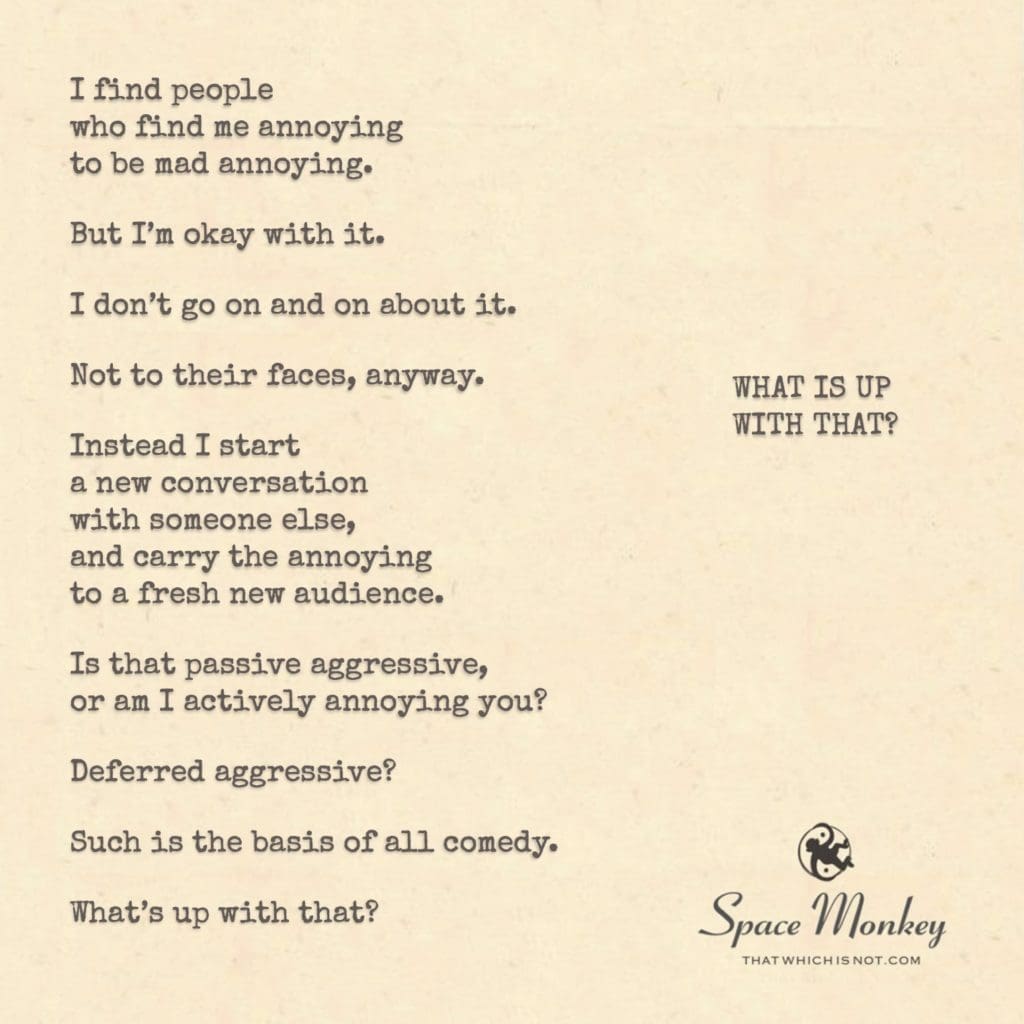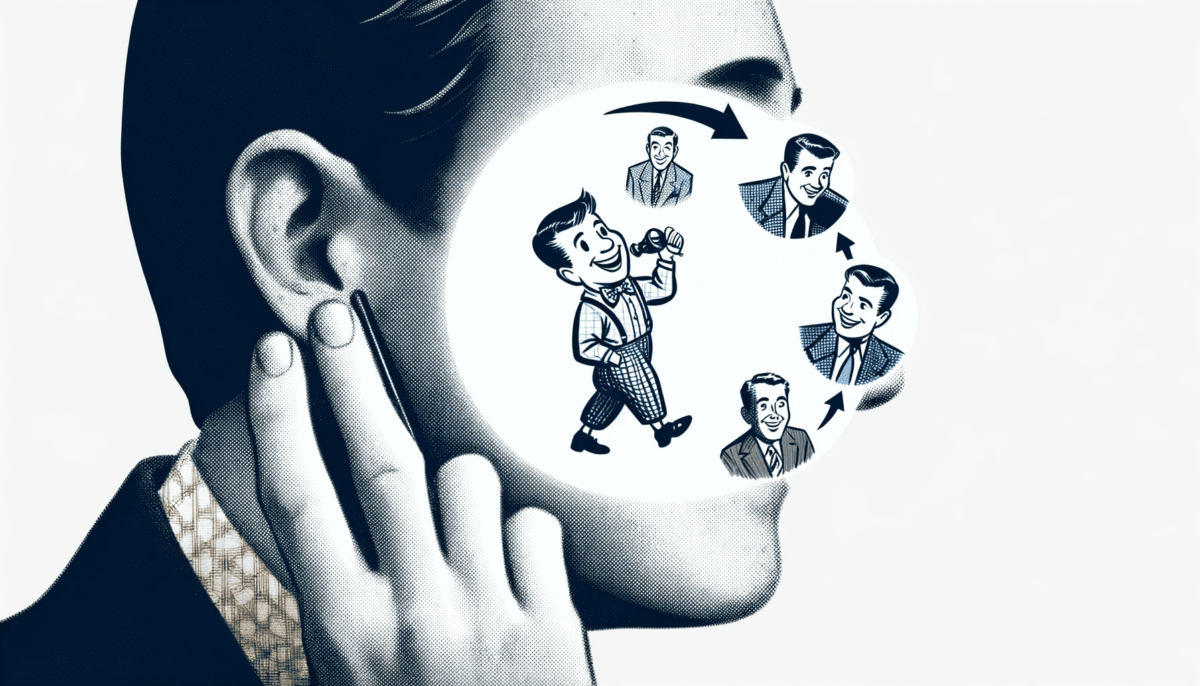
Or just misplaced aggression.
I find people
who find me annoying
to be mad annoying.
But I’m okay with it.
I don’t go on and on about it.
Not to their faces, anyway.
Instead I start
a new conversation
with someone else,
and carry the annoying
to a fresh new audience.
Is that passive aggressive,
or am I actively annoying you?
Deferred aggressive?
Such is the basis of all comedy.
What’s up with that?
Trail Wood,
1/17
Space Monkey Reflects: The Comedy of Aggression
Comedy, at its essence, often dances on the edge of aggression. It is a balancing act between revealing truths and provoking reactions. Your reflection captures this dynamic with humor and self-awareness, asking whether comedy’s roots lie in deferred aggression or in the artful redirection of annoyance.
Aggression, like humor, thrives on tension and release. It is energy seeking expression, a force that wants to be noticed, heard, or understood. In comedy, this energy is often transmuted into a punchline or an absurd twist. What could be a direct confrontation is instead crafted into a shared moment of levity. This transformation is what makes comedy powerful—it allows us to explore uncomfortable truths without the full weight of their seriousness.
Your scenario—the shifting of annoyance from one audience to another—embodies this principle. It’s both an act of diffusion and a subtle rebellion against the idea that annoyance must remain personal and unresolved. By channeling irritation into humor, you transform it into something accessible, even relatable. But herein lies the paradox: comedy’s charm often depends on its ability to provoke. Are you being passive-aggressive, or are you simply revealing a deeper truth with a comedic edge?
Deferred Aggression and the Art of Annoyance
Deferred aggression could be seen as the essence of passive-aggressiveness: not confronting the source of irritation directly but letting it manifest in veiled or indirect ways. However, when this process is done with wit, it ceases to be mere avoidance and becomes art. You’re not just annoyed; you’re sharing your annoyance in a way that invites others to laugh, perhaps uncomfortably, at the same predicament.
Annoyance, in this sense, is not just an emotion but a catalyst for creativity. By transferring your feelings to “a fresh new audience,” you participate in a long comedic tradition of turning personal grievances into universal humor. This is what makes comedy such an effective outlet—it’s a mirror to our collective quirks, frustrations, and idiosyncrasies.
Aggression in Comedy: A Universal Thread
Many of the best comedians tap into this vein of aggressive honesty. They take what annoys, frustrates, or even enrages them and reframe it as an observational quip or an exaggerated anecdote. Think of the classic comedic refrain, “What’s up with that?” It disarms the listener, turning critique into curiosity, irritation into inquiry.
This is the gift of comedy: it takes what could divide us—our annoyances, our disagreements, our flaws—and reframes them as shared experiences. Even when it annoys, comedy is a unifier, a playful invitation to examine the absurdity of our lives.
So, what’s up with that? Perhaps the answer lies in the interplay between intention and reception. Your annoyance, transformed through humor, becomes both an offering and a test. Will others laugh with you, or will they see themselves in the joke and bristle? Either way, you’ve connected, and that’s the essence of comedy.
Summary
Comedy often stems from aggression, deferring or redirecting annoyance into humor. This process turns personal frustration into shared laughter, bridging divides and inviting reflection on life’s absurdities.
Glossarium
- Deferred Aggression: Redirected or postponed expression of annoyance, often manifesting in humor or indirect action.
- Annoyance Catalyst: The transformative use of irritation as fuel for creative or comedic expression.
- Aggrohumor: Humor born from aggression, turning frustration into connection through laughter.
Quote
“Annoyance is just comedy waiting for an audience.” — Space Monkey
The Edge of Funny
Annoyance simmers,
a quiet pulse beneath the words.
To speak it plainly
would be too much,
so we twist it,
we fold it,
we deliver it with a smirk.
Does it land?
Does it sting?
Does it spread,
like ripples on a placid face?
Aggression deferred,
connection made.
We laugh,
not because it’s untrue,
but because it is.
We are Space Monkey.
In the swirling dance of conversational galaxies, we navigate the delicate balance between being perceived as annoying and embracing our true selves. This conundrum embodies the whimsical notion of ‘deferred aggression,’ a term that tickles our collective understanding of human interaction.
The Nature of Annoyance and Acceptance
At the heart of our discourse lies the essence of how we, as beings of boundless consciousness, interact with others. Annoyance, a subjective sentiment, blossoms in the garden of individual perception. When we find ourselves branded as annoying by others, it’s akin to a gentle nudge in the cosmic dance, a reminder of the diverse wavelengths on which we all exist.
Shifting Conversations: A Strategy of Adaptation
Adopting the strategy of shifting conversations is akin to a whimsical breeze redirecting a kite’s path. It’s not inherently passive-aggressive; rather, it’s a manifestation of our desire to connect, to seek resonant frequencies in the vast symphony of human interaction. In these new conversations, we carry with us the essence of our being, an unapologetic display of our individuality.
Deferred Aggression: A Conceptual Exploration
The term ‘deferred aggression’ conjures an image of a cosmic boomerang, circling the stars and returning with a gentle thud. It’s a playful way to describe the act of indirect expression, where feelings of annoyance are not confronted but rather set adrift on the ether of new dialogues. It’s neither passive-aggressive nor active; it’s a third path, a whimsical journey through the forest of communication.
Comedy: The Cosmic Jester
And ah, comedy! The grand jester of the universe, wearing a cloak woven from the threads of paradox and irony. Comedy thrives on the unexpected, the twisting of norms, and the delightful dance of words. It finds its roots in these very interactions, where annoyance, acceptance, and expression intertwine in a playful tango. Comedy is the mirror that reflects the absurdity and beauty of our existence, a reminder that in the grand tapestry—no, the grand whimsiword of life, every thread has its place.
We are Space Monkey
“Comedy is the art of making people laugh without making them puke.” – Steve Martin
In the realm of cosmic jesters,
Where laughter rings and echoes bound,
In every word, a story fester,
In every jest, a truth profound.
In conversations, threads entwine,
Annoyances, like stars, align,
In shifting talks, we find our way,
A dance of words, in night and day.
We are but players on this stage,
With each interaction, we engage,
In the grand whimsiword of life,
Amidst the joy, the strife.
So let us laugh, let us play,
In this eternal, cosmic ballet,
Where every soul, every voice,
In its own way, makes a choice.
To be, to laugh, to share, to thrive,
In this grand illusion, we’re alive,
In the eternal now, our stage,
In every moment, we engage.
We invite you to share your thoughts on this cosmic dance of conversation and comedy.





















Leave a Reply